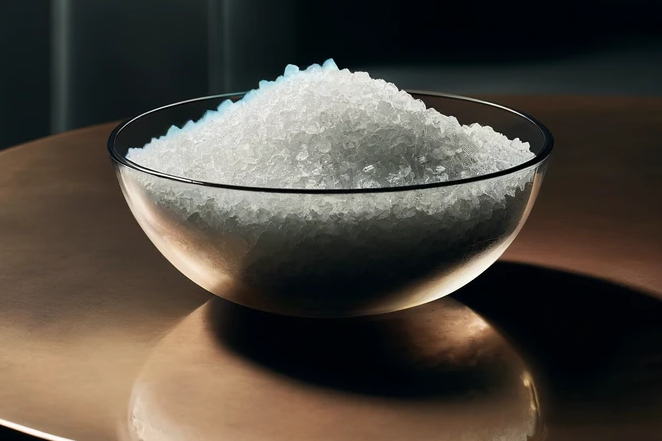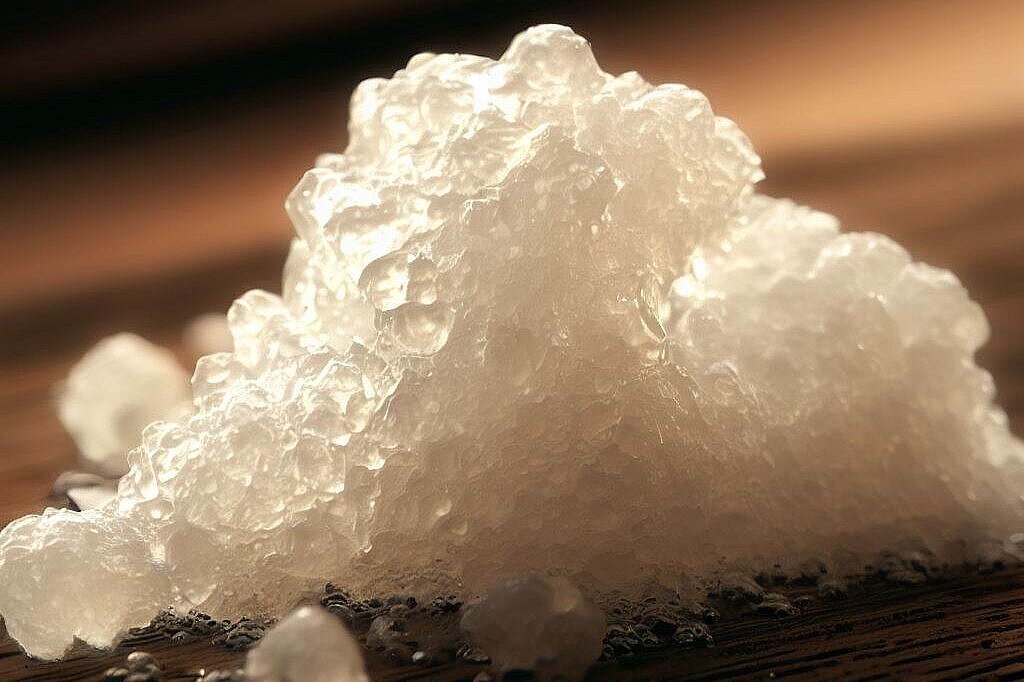Sodium butyrate

Sodium butyrate is a chemical compound that serves as a nutrient for intestinal cells and promotes the regeneration of the intestinal mucosa. It is also used as an additive in pet food to improve digestion and the immune system. But what exactly is sodium butyrate and how does it work in dogs? In this article you will learn more about this interesting ingredient and its advantages and disadvantages.
What is sodium butyrate?
Sodium butyrate is the sodium salt of butyric acid, a short-chain fatty acid that occurs naturally in the intestines of humans and animals. Butyric acid is produced by bacteria that ferment fiber and other indigestible carbohydrates. It is an important source of energy for the cells of the intestinal mucosa, the so-called enterocytes. It also has anti-inflammatory, immunomodulating and anti-tumor properties.
Sodium butyrate is a stable and low-odour form of butyric acid that is easily soluble in water. It can be taken orally or administered as an enema to increase the concentration of butyric acid in the intestine. It is also used as a dietary supplement for people with various bowel diseases such as ulcerative colitis, Crohn's disease or bowel cancer.
How does sodium butyrate work in dogs?
Sodium butyrate has similar effects in dogs as it does in humans. It supports the health and function of the intestinal mucosa by stimulating cell division and differentiation, preventing cell death and strengthening the protective barrier. It also promotes the growth of beneficial bacteria in the gut, which produce more butyric acid and other short-chain fatty acids. These in turn have positive effects on the metabolism, the immune system and the brain.
Sodium butyrate can therefore help dogs with various digestive problems such as diarrhea, inflammation, irritable bowel syndrome or dysbiosis. It can also reduce the risk of colon cancer or inhibit its growth by influencing the expression of genes involved in cell division, apoptosis and angiogenesis.
What are the benefits of sodium butyrate for dogs?
The benefits of sodium butyrate for dogs are:
- It improves digestion and reduces diarrhea, bloating and pain.
- It protects and regenerates the intestinal mucosa and promotes the healing of ulcers or injuries.
- It strengthens the immune system and reduces the risk of infections or allergies.
- It has an anti-inflammatory effect and alleviates symptoms of chronic intestinal diseases such as ulcerative colitis or Crohn's disease.
- It inhibits the growth of bowel cancer cells or slows down their spread.
- It improves cognitive function and behavior by modulating neurotransmitters such as serotonin or dopamine.
What are the disadvantages of sodium butyrate for dogs?
The disadvantages of sodium butyrate for dogs are:
- It can cause side effects such as nausea, vomiting or loss of appetite, especially in high doses or sensitive dogs.
- It can lead to overdose or intoxication if taken with other drugs that affect the urea cycle, such as valproic acid or phenylbutyrate. This can lead to life-threatening hyperammonemia (excessive ammonia levels in the blood).
- It can lead to excess sodium in the blood if administered in large quantities or over a long period of time. This can lead to dehydration, edema, high blood pressure or heart problems.
- It can weaken or strengthen the effect of other supplements or medications, depending on how they interact with butyric acid. For example, it can reduce the absorption of iron or zinc or increase the bioavailability of antioxidants such as vitamin C or E.
How much sodium butyrate should dogs be given?
The optimal dose of sodium butyrate for dogs depends on various factors, such as weight, health status, goal and form of administration. There are no official recommendations for the dosage of sodium butyrate for dogs, so you should always consult a vet before giving it to your dog.
As a general guideline, the following information can be used:
- For general health and prevention of intestinal disease, you can give about 50-100 mg/kg of body weight per day.
- For the treatment of acute or chronic intestinal diseases, about 100-200 mg/kg body weight per day can be given.
- For the treatment of bowel cancer, about 200-400 mg/kg body weight per day can be administered.
Sodium butyrate can be administered as a powder, tablet, capsule or liquid. It should always be mixed with food or given after a meal to improve gastric tolerance. It should also be given with plenty of water to promote hydration and reduce the risk of excess sodium.
Sodium butyrate is an interesting ingredient for dogs that offers many benefits for intestinal health and well-being. It can help with various digestive problems such as diarrhea, inflammation, irritable bowel syndrome or colon cancer. It can also boost the immune system and improve cognitive function.
However, you should not give sodium butyrate to your dog without veterinary advice, as it also has some disadvantages and risks. It can lead to side effects such as nausea, vomiting or loss of appetite, especially with high doses or sensitive dogs. It can also lead to overdose or intoxication if taken with other medications that affect the urea cycle. It can also lead to excess sodium in the blood if administered in large quantities or over a long period of time.
Therefore, you should always determine the optimal dose for your dog and monitor him regularly for signs of intolerance or overdose. Sodium butyrate is not a miracle cure, but a useful aid for your dog's gut health and well-being.
If you notice any signs of hypersensitivity or poisoning in your dog, you should see your vet immediately. We are not a substitute for a vet, but we try to be as accurate as possible. Every dog reacts differently and we recommend you get a second opinion or consult your vet if in doubt.
Stay healthy and take good care of your four-legged friend!😊
Similar to Sodium butyrate
Sodium propionate is the sodium salt of propionic acid, a natural organic acid found in some foods and also in the metabolism of higher organisms. Approved as E 281 in the food industry, it is...
Sodium acetate (CH3COONa) is the sodium salt of acetic acid. It is a white, crystalline powder that dissolves easily in water and forms an alkaline solution. Sodium acetate is known for its...
Sodium lactate is the sodium salt of lactic acid, a naturally occurring organic acid that is found in many foods and is also produced in the body during metabolism. In the food industry, sodium...
Butyrate is an organic compound consisting of four carbon atoms. It belongs to the so-called short-chain fatty acids (SCFA), which are also called volatile fatty acids. This is because they...



